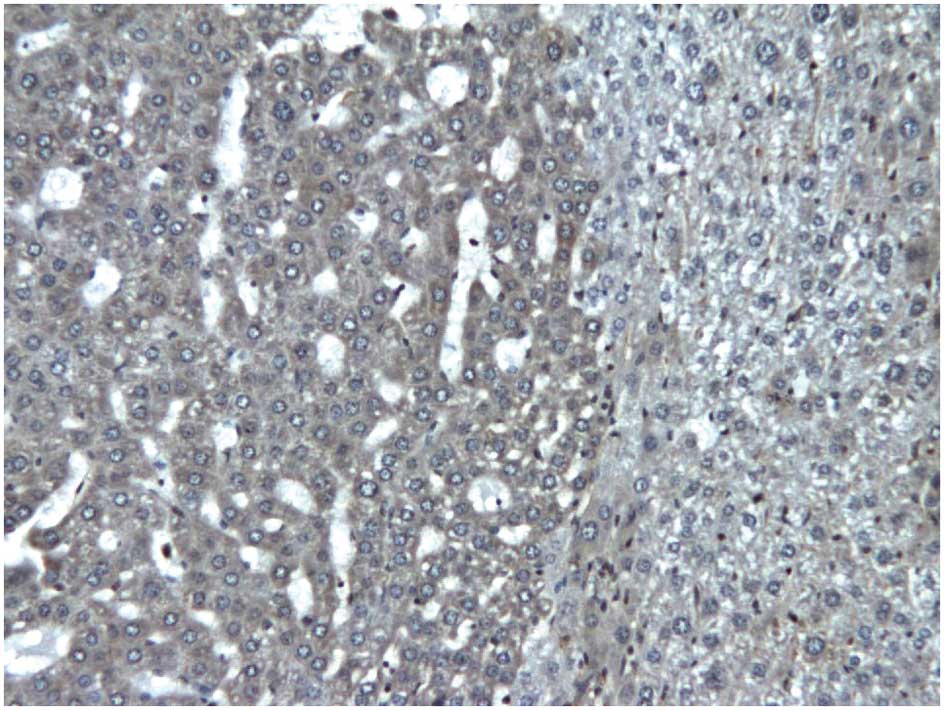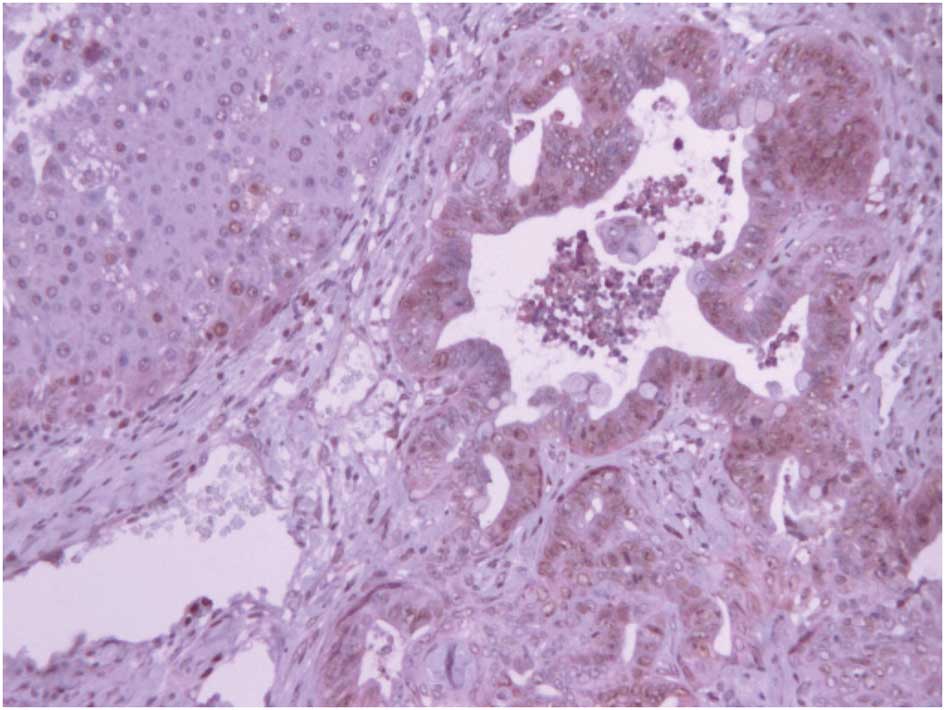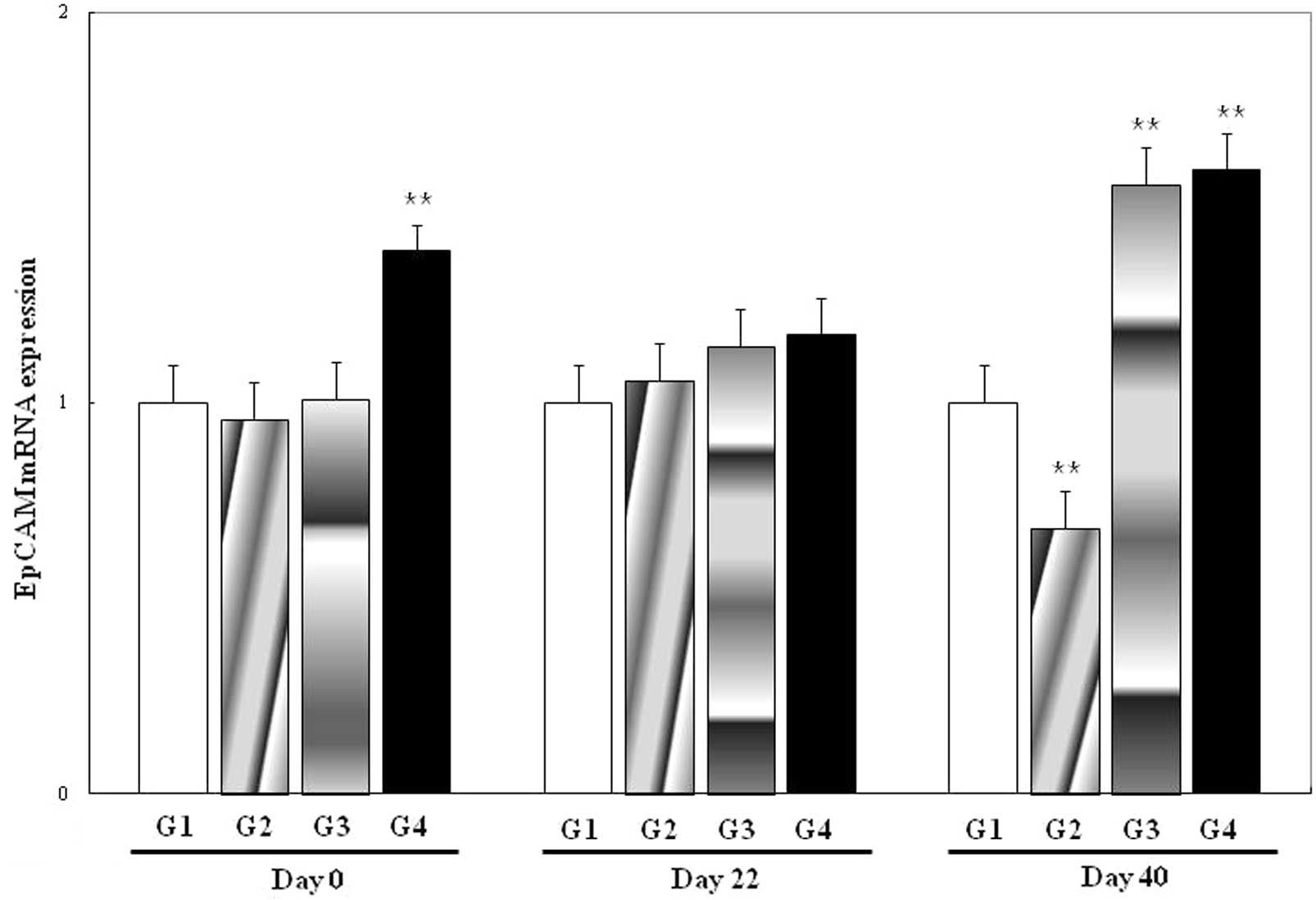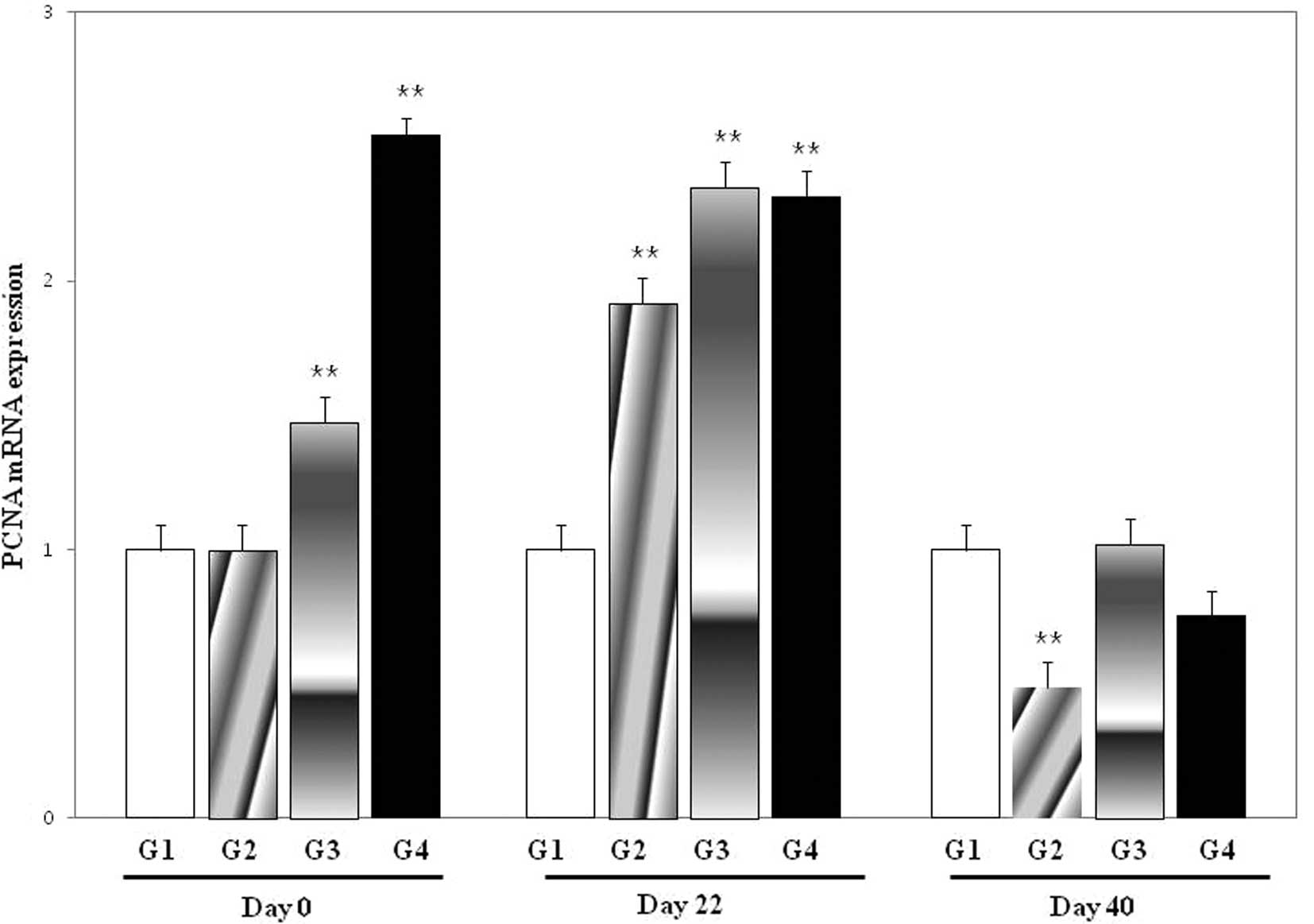|
1
|
Rambhatla L, Chiu CP, Kundu P, Peng Y and
Carpenter MK: Generation of hepatocyte-like cells from human
embryonic stem cells. Cell Transplant. 12:1–11. 2003. View Article : Google Scholar : PubMed/NCBI
|
|
2
|
Turner R, Lozoya O, Wang Y, Cardinale V,
Gaudio E, Alpini G, Mendel G, Wauthier E, Barbier C, Alvaro D and
Reid LM: Human hepatic stem cell and maturational liver lineage
biology. Hepatology. 53:1035–1045. 2011. View Article : Google Scholar : PubMed/NCBI
|
|
3
|
Kenyon J and Gerson SL: The role of DNA
damage repair in aging of adult stem cells. Nucleic Acids Res.
35:7557–7565. 2007. View Article : Google Scholar : PubMed/NCBI
|
|
4
|
Alison MR: Liver stem cells: implications
for hepatocarcinogenesis. Stem Cell Rev. 1:253–260. 2005.
View Article : Google Scholar : PubMed/NCBI
|
|
5
|
Sell S and Dunsford HA: Evidence for the
stem cell origin of hepatocellular carcinoma and
cholangiocarcinoma. Am J Pathol. 134:1347–1363. 1989.PubMed/NCBI
|
|
6
|
Visvader JE and Lindeman GJ: Cancer stem
cells in solid tumours: accumulating evidence and unresolved
questions. Nat Rev Cancer. 8:755–768. 2008. View Article : Google Scholar : PubMed/NCBI
|
|
7
|
van der Gun BT, Melchers LJ, Ruiters MH,
de Leij LF, McLaughlin PM and Rots MG: EpCAM in carcinogenesis: the
good, the bad or the ugly. Carcinogenesis. 31:1913–1921.
2010.PubMed/NCBI
|
|
8
|
Yoon SM, Gerasimidou D, Kuwahara R,
Hytiroglou P, Yoo JE, Park YN and Theise ND: Epithelial cell
adhesion molecule (EpCAM) marks hepatocytes newly derived from
stem/progenitor cells in humans. Hepatology. 53:964–973. 2011.
View Article : Google Scholar : PubMed/NCBI
|
|
9
|
Yamashita T, Forgues M, Wang W, Kim JW, Ye
Q, Jia H, Budhu A, Zanetti KA, Chen Y, Qin LX, Tang ZY and Wang XW:
EpCAM and alpha-fetoprotein expression defines novel prognostic
subtypes of hepatocellular carcinoma. Cancer Res. 68:1451–1461.
2008. View Article : Google Scholar
|
|
10
|
Fausto N and Campbell JS: Mouse models of
hepatocellular carcinoma. Semin Liver Dis. 30:87–98. 2010.
View Article : Google Scholar : PubMed/NCBI
|
|
11
|
Diwan BA, Rice JM, Ward JM, Ohshima M and
Lynch PH: Inhibition by phenobarbital and lack of effect of
amobarbital on the development of liver tumors induced by
N-nitrosodiethylamine in juvenile B6C3F1 mice. Cancer Lett.
23:223–234. 1984. View Article : Google Scholar : PubMed/NCBI
|
|
12
|
Jang JJ, Weghorst CM, Henneman JR, Devor
DE and Ward JM: Progressive atypia in spontaneous and
N-nitrosodiethylamine-induced hepatocellular adenomas of C3H/HeNCr
mice. Carcinogenesis. 13:1541–1547. 1992. View Article : Google Scholar : PubMed/NCBI
|
|
13
|
Tamano S, Merlino GT and Ward JM: Rapid
development of hepatic tumors in transforming growth factor alpha
transgenic mice associated with increased cell proliferation in
precancerous hepatocellular lesions initiated by
N-nitrosodiethylamine and promoted by phenobarbital.
Carcinogenesis. 15:1791–1798. 1994. View Article : Google Scholar
|
|
14
|
Jensen MR, Factor VM, Fantozzi A, Helin K,
Huh CG and Thorgeirsson SS: Reduced hepatic tumor incidence in
cyclin G1-deficient mice. Hepatology. 37:862–870. 2003. View Article : Google Scholar : PubMed/NCBI
|
|
15
|
Vesselinovitch SD, Koka M, Mihailovich N
and Rao KV: Carcinogenicity of diethylnitrosamine in newborn,
infant, and adult mice. J Cancer Res Clin Oncol. 108:60–65. 1984.
View Article : Google Scholar : PubMed/NCBI
|
|
16
|
Zhou QJ, Xiang LX, Shao JZ, Hu RZ, Lu YL,
Yao H and Dai LC: In vitro differentiation of hepatic progenitor
cells from mouse embryonic stem cells induced by sodium butyrate. J
Cell Biochem. 100:29–42. 2007. View Article : Google Scholar : PubMed/NCBI
|
|
17
|
Yovchev MI, Grozdanov PN, Zhou H, Racherla
H, Guha C and Dabeva MD: Identification of adult hepatic progenitor
cells capable of repopulating injured rat liver. Hepatology.
47:636–647. 2008. View Article : Google Scholar : PubMed/NCBI
|
|
18
|
Hamazaki T, Iiboshi Y, Oka M, Papst PJ,
Meacham AM, Zon LI and Terada N: Hepatic maturation in
differentiating embryonic stem cells in vitro. FEBS Lett.
497:15–19. 2001. View Article : Google Scholar : PubMed/NCBI
|
|
19
|
Touboul T, Hannan NR, Corbineau S,
Martinez A, Martinet C, Branchereau S, Mainot S, Strick-Marchand H,
Pedersen R, Di Santo J, Weber A and Vallier L: Generation of
functional hepatocytes from human embryonic stem cells under
chemically defined conditions that recapitulate liver development.
Hepatology. 51:1754–1765. 2010. View Article : Google Scholar
|
|
20
|
Wicha MS, Liu S and Dontu G: Cancer stem
cells: an old idea - a paradigm shift. Cancer Res. 66:1883–1890;
discussion 1895–1886, 2006.
|
|
21
|
Al-Hajj M and Clarke MF: Self-renewal and
solid tumor stem cells. Oncogene. 23:7274–7282. 2004. View Article : Google Scholar : PubMed/NCBI
|
|
22
|
Kang JS, Wanibuchi H, Morimura K, Gonzalez
FJ and Fukushima S: Role of CYP2E1 in diethylnitrosamine-induced
hepatocarcinogenesis in vivo. Cancer Res. 67:11141–11146. 2007.
View Article : Google Scholar : PubMed/NCBI
|
|
23
|
Gray R, Peto R, Brantom P and Grasso P:
Chronic nitrosamine ingestion in 1040 rodents: the effect of the
choice of nitrosamine, the species studied, and the age of starting
exposure. Cancer Res. 51:6470–6491. 1991.PubMed/NCBI
|
|
24
|
Pitot HC, Dragan YP, Teeguarden J, Hsia S
and Campbell H: Quantitation of multistage carcinogenesis in rat
liver. Toxicol Pathol. 24:119–128. 1996. View Article : Google Scholar : PubMed/NCBI
|


















